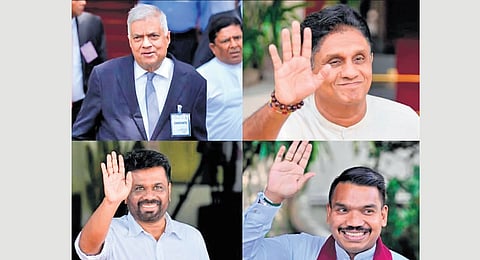

JAFFNA: With a crucial presidential election just days away, Jaffna, Sri Lanka’s northern capital does not reflect South’s political frenzy. A record number of candidates have joined the fray, 39 in all, including a common candidate from the North, Pakkiyaselvam Ariyanethiran, representing Sri Lanka’s largest Tamil political entity, Ilankai Tamil Arasu Kachchi (ITAK).
The euphoric campaigning in the South is conspicuous by its absence in the North as people go about, doing their daily job while campaigning continues with less fanfare.
Fifteen years after the protracted war ended in May 2009, the North of Sri Lanka continues to reel under its multiple impacts, with normalcy, as known in the rest of the country, still an illusion. The North has long-unresolved issues, ranging from wartime disappearances, homes under military occupation, livelihoods, unemployment, infrastructure development and safety.
At the tail end of the presidential campaign, frontrunners like incumbent and common candidate president Ranil Wickremesinghe, Samagi Jana Balawegaya (SJB) leader Sajith Premadasa and Anura Dissanayake of the Marxist National Peoples’ Power (NPP) continuing to woo the Tamil votes.
But for the people of Jaffna, there are other issues to grapple with. Chadrasekaran Haran (51) sells vegetables for a living. He treats the September 21 presidential race with both disinterest and disdain.
“The result will matter to us only if the next president can consider the economic problems faced by the people. After the economic collapse in 2022, we fell from the frying pan to the fire,” he says.
Transport costs have doubled in the past two years with fuel costs becoming unbearable for the average citizen. The sales have dropped due to price increases in vegetables, making people like Haran find it difficult to make ends meet. “We are barely surviving,” he says.
The end of the war offered a window of opportunity to develop the tourism sector, particularly with curious local travellers looking for a glimpse of the former conflict zone as well as cultural tourists. “The economic meltdown brought an effective end. The fuel costs became unbearable, and people stopped visiting,” says Kamalmalai Thomas, 49. The immediate issues are clearly economic.
‘The war has snatched many things from people... We’re less than 2nd class citizens’
Jesudasan Varathan, 46, a fisherman, says his livelihood has become more difficult. “The fuel costs are killing us. We have not hit the streets to protest against the unbearable cost of living and the many hardships, but it is pointless to believe that a southern president will understand what we daily go through,” he said.
It is not so much the lack of trust for the southern leaders than a sense of despondency after decades of Tamil rights being undermined by the majority-led governments and a war that had cost over 1,00,000 lives on both sides. “People have so many unresolved problems linked to war, but they have not been addressed. Those issues remain the same. There is a new layer of suffering due to extreme economic hardships,” adds Varathan.
Does that mean the North’s common candidate is seen as someone capable of bargaining with the centre to have the many unresolved issues addressed? There is not much hope in that either.
“It is good to field a candidate but it will be tokenistic. However, the candidate can represent our issues during the elections and once a new president is installed, try to have these issues addressed, starting with the disappearances, lack of closure, property issues and livelihoods, Varathan said.
The Tamils make up for 11% of Sri Lanka’s 22 million population and are largely spread across the island’s Northern and Eastern regions. It is widely believed that Ranil Wickremesinghe, the then UNP candidate lost the 2005 presidential election due to an election boycott orchestrated by the Liberation Tigers of Tamil Eelam (LTTE), installing hawkish Mahinda Rajapaksa in office.
While there is a general trend in favour of the NPP candidate, the minority votes are key to winning a presidential race. The Muslim community, making up 9% of the total population, is primarily backing SJB’s Premadasa, with the country’s main Muslim political party, Sri Lanka Muslim Congress extending its support to Premadasa. Analysts say that the minorities of Sri Lanka hold the key to tilt the election in favour of a frontrunner of their choice.
“Whoever wins the September 21 presidential race, the Northerners can only hope that our issues will make it to their agenda. The war has snatched many things from the people. The region needs development, economic support for the community and to have their past grievances addressed. We are less than second class citizens today,” says Murugan Annarasa, 64, a shopkeeper.
Tamils make up 11% of 22 million population
The Tamils make up for 11% of Sri Lanka’s 22 million population and are largely spread across the island’s Northern and Eastern regions. It is believed that Ranil Wickremesinghe lost 2005 poll due to a boycott by the LTTE.
Dilrukshi Handunnetti
Award-winning journalist and lawyer, founder and director of the Colombo-based Center for Investigative Reporting (CIR)